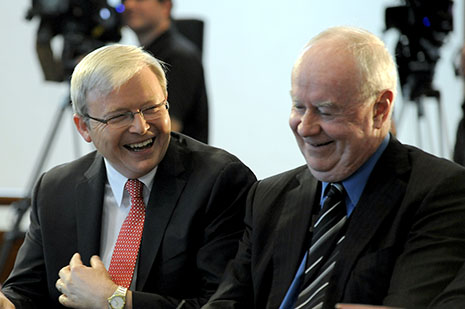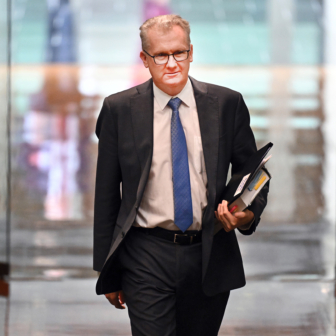WHEN IT COMES to interpreting recent history, Kevin Rudd has a plan, but does anyone apart from him know what it is? His favourite story is about neoliberalism, but what is its purpose?
It’s not a crime to arrive in office and then traduce and caricature your predecessors. All governments do it. After an election, the voters’ decision is widely perceived as having been the “correct” one. In opinion polls more people will claim to have voted for the current government than actually did. If it’s a change of government, the new opposition is suddenly a directionless rabble while the new government embodies all that is charismatic, popular and witty. A story needs to be told and it would be almost irresponsible for the victor not to push its version of history.
On the rarest of occasions they refrain. In June 1996, prime minister John Howard told a conference of international bankers that the Australian economy, inherited from the Keating government three months earlier, was “really better than the ‘curate’s egg’ – it was a little better than just good in parts.” Furthermore, there was “no doubt that the Australian economy continues by world standards to enjoy very strong growth.”
Howard’s outburst of candour possibly came because he was among likely friends and allies, or perhaps it reflected the lack of discipline that marked his first term. And he was selling Australia as a good place to do business.
In any event, such generosity towards the previous government was never heard again during his prime ministership, and for the next eleven years the message was simple and relentless: the Keating and Hawke governments had been abominable economic managers whose reign led to nothing but misery. Treasurer Peter Costello was particularly adept at ramming home the “Beazley black hole,” record interest rates and $90 billion of Labor debt.
There was nothing special about this; it was almost word for word what Bob Hawke and Paul Keating had said about the Fraser years.
These stories may be simplistic, unfair and internally inconsistent, but they matter; they are not just esoteric discussions among the political class. The majority of voters aren’t paying attention, but the journalists are. Victors do get first dibs on history, and if a narrative is repeated enough then reporters can come to believe it. They internalise it and regurgitate it. Old journos leave, new ones arrive and the narrative becomes accepted as gospel and embedded in the very fabric of political reporting, right down to how stories are framed and headlines are written.
So it was that by the time of the 2007 election – two decades after we’d had a federal Labor government, led by Hawke, that could rarely stop boasting of its surpluses and heroic fiscal feats – many reporters were aghast at the idea of a Labor leader (Rudd) talking about fiscal prudence. Labor leaders never spoke of such things!
Now it’s Rudd’s turn with the pen. Most recently, of course, he launched Paul Kelly’s book The March of the Patriots with a highly partisan retelling of the last twenty-five years of reform that cast the Howard government as “indolent.” This unleashed fury in the Liberal Party and provoked an 800-word response in the Australian from the former prime minister, but apart from questions about the appropriateness of its setting, his speech was par for the course.
But his other narrative, the topic of his essays, is different, and strange. According to this narrative, the Howard government and its ideological friends were fundamentalist free-marketeers who, by letting everything rip, caused the current global financial crisis. Leaving the causes of the GFC to others, it is absurd to paint the Howard government, the biggest taxers and spenders (as a proportion of GDP) the country had seen, as mad free-marketeers. More importantly, though, who is Rudd telling this story to?
Journalists are largely treating it as a joke. Business obviously doesn’t agree, and the voters don’t care. The only place where Rudd’s explanation gets traction seems to be among folks who are sometimes derided as the “intelligentsia.” Robert Manne, in the Monthly, is a big fan. Professor Manne might be influential in some circles, but not where it counts: in the newspapers and radio and television current affairs programs.
Rudd needs to convince press gallery members, preferably the young impressionable ones. The version he presented at the Kelly launch was different from the one in the essays. It told of a lazy Howard-led government awash with funds thanks to happy circumstances, interested in little more than short-term popularity, unable to sell anything positive but always ready with a diversion.
That one almost writes itself. But Hayek and neoliberalism? Maybe time will tell us who Mr Rudd is speaking to. •





